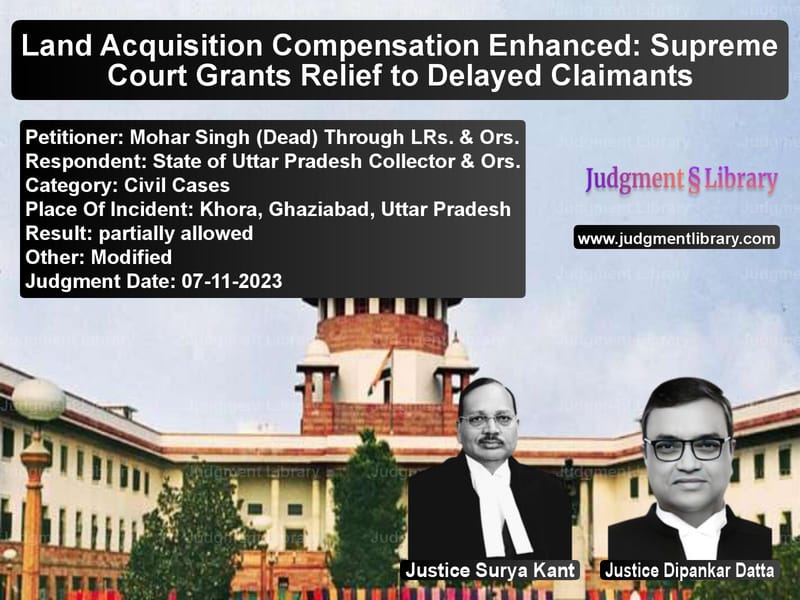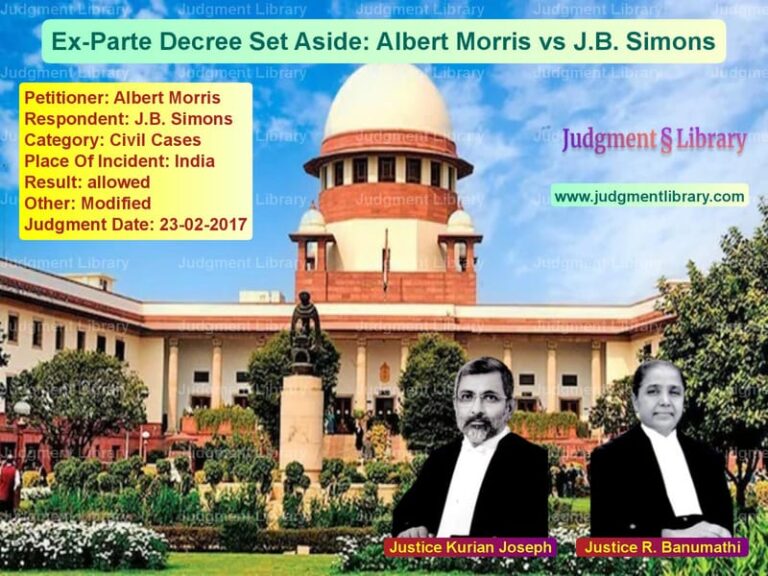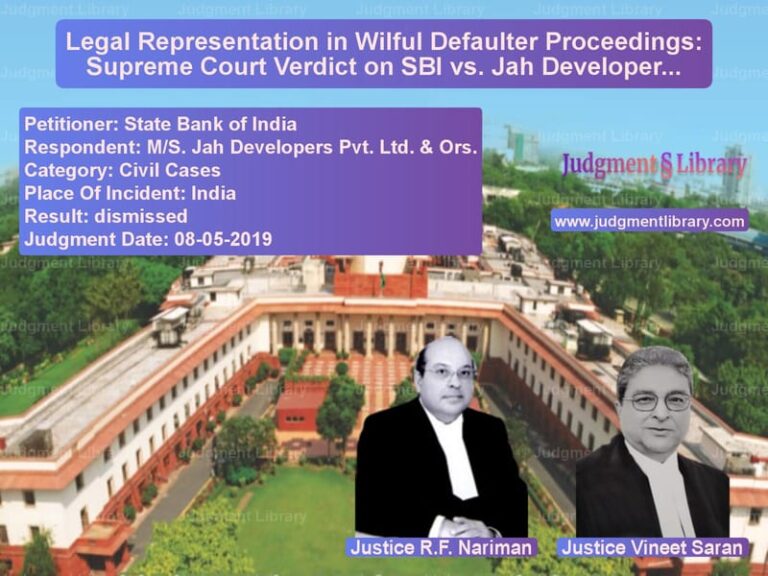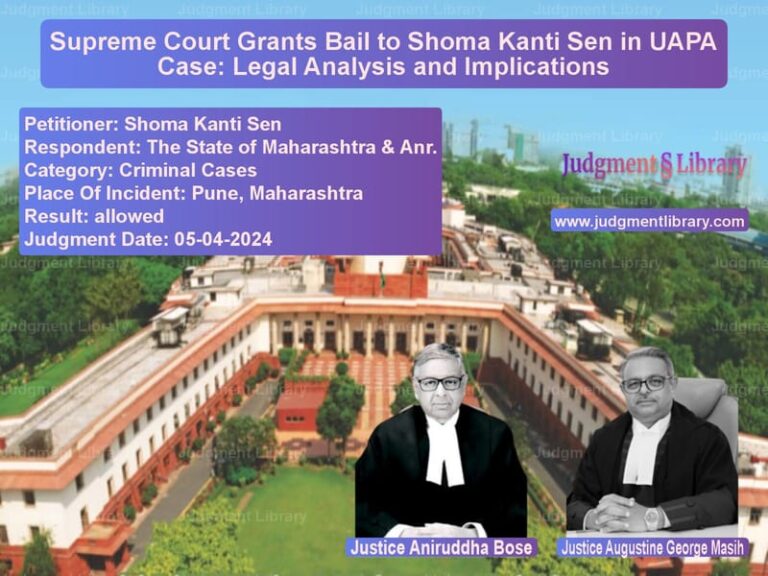Land Acquisition Compensation Enhanced: Supreme Court Grants Relief to Delayed Claimants
The case of Mohar Singh (Dead) Through LRs. & Ors. vs. State of Uttar Pradesh Collector & Ors. pertains to a land acquisition dispute where landowners sought enhanced compensation for their acquired land in Ghaziabad, Uttar Pradesh. The Supreme Court addressed the critical question of whether delayed appeals for compensation enhancement should be entertained and to what extent claimants can be granted relief.
Background of the Case
The dispute originated when the government issued a notification on March 17, 1988, for acquiring land measuring 902.2046 acres in village Khora, Ghaziabad, under the Land Acquisition Act, 1894. Subsequently, an award was passed on February 1, 1991, fixing the compensation at ₹70 per square yard. Dissatisfied with this rate, most landowners, including the appellants, sought reference under Section 18 of the Act.
On April 6, 1998, the Xth Additional District Judge, Ghaziabad, partially accepted the landowners’ references and enhanced the compensation to ₹106 per square yard. However, many landowners, including the appellants, did not immediately file appeals against this award.
Delay in Seeking Further Compensation Enhancement
While some landowners promptly approached the High Court in 1998, the appellants did not file their first appeals until 2011, resulting in a delay of nearly 13 years. Their appeal sought condonation of delay based on:
- Illiteracy and lack of legal awareness regarding their rights.
- Financial constraints preventing them from arranging the required court fees.
- The fact that similar appeals from other landowners were still pending.
However, on March 9, 2016, the Allahabad High Court refused to condone the delay and dismissed their appeals.
Subsequent Enhancements in Compensation
Meanwhile, other landowners who had filed timely appeals secured further enhancements:
- On July 4, 2016, the High Court enhanced compensation to ₹130 per square yard.
- Subsequently, in Jitendra & Ors. vs. State of Uttar Pradesh (2017), the Supreme Court further increased the amount to ₹150 per square yard.
Petitioner’s Arguments
The appellants contended:
- That they should be granted parity with other landowners who had received enhanced compensation.
- The High Court should have condoned the delay since other appeals were pending at the same time.
- The principle of equal treatment under Article 14 of the Constitution should apply.
- The enhanced compensation awarded in Jitendra & Ors. should also be granted to them.
Respondent’s Arguments
The State of Uttar Pradesh and NOIDA opposed the appeals, arguing:
- The appellants displayed gross negligence by delaying their appeals for 13 years.
- Allowing their appeal would set a precedent that encourages delayed claims out of greed.
- Many of these landowners had already received significant compensation and their plea of financial difficulty was not justified.
Key Legal Issues Considered
1. Whether Delay in Filing Appeals for Compensation Enhancement Can Be Condoned
The Supreme Court examined whether the delay in filing appeals should be condoned, given that land acquisition compensation matters involve public interest.
2. Whether Appellants Were Entitled to the Enhanced Compensation Granted in Jitendra & Ors.
The Court considered whether the principle of parity applied, and whether compensation granted to other landowners should be extended to the appellants despite their delayed appeals.
3. Whether Statutory Benefits and Interest Should Be Granted for the Period of Delay
The Court analyzed whether the appellants should receive interest and other statutory benefits for the period they had delayed filing their appeals.
Supreme Court’s Verdict
The Supreme Court ruled partially in favor of the appellants, stating:
- The delay in filing appeals, though excessive, should be condoned in the interest of fairness.
- The appellants should be entitled to the enhanced compensation of ₹150 per square yard, in line with the ruling in Jitendra & Ors.
- However, they should not be entitled to interest and statutory benefits for the period of delay (13 years).
- The deficiency in court fees must be paid before they can receive the enhanced compensation.
Key Takeaways from the Judgment
- Delayed Appeals in Compensation Matters May Be Considered: The Supreme Court held that in cases of land acquisition, delay alone should not bar a fair claim.
- Parity in Compensation for Landowners: The Court ensured that all landowners received the same compensation, regardless of when they filed their appeals.
- Interest and Benefits Limited for Late Claimants: While enhanced compensation was granted, interest for the period of delay was denied.
- Legal Awareness and Timely Action Are Crucial: The ruling highlights the importance of filing appeals within the prescribed timeframe to avoid financial loss.
This judgment reinforces the principle of fair compensation in land acquisition cases while balancing the need to prevent undue delays in seeking legal remedies.
Petitioner Name: Mohar Singh (Dead) Through LRs. & Ors..Respondent Name: State of Uttar Pradesh Collector & Ors..Judgment By: Justice Surya Kant, Justice Dipankar Datta.Place Of Incident: Khora, Ghaziabad, Uttar Pradesh.Judgment Date: 07-11-2023.
Don’t miss out on the full details! Download the complete judgment in PDF format below and gain valuable insights instantly!
Download Judgment: mohar-singh-(dead)-t-vs-state-of-uttar-prade-supreme-court-of-india-judgment-dated-07-11-2023.pdf
Directly Download Judgment: Directly download this Judgment
See all petitions in Property Disputes
See all petitions in Damages and Compensation
See all petitions in Judgment by Surya Kant
See all petitions in Judgment by Dipankar Datta
See all petitions in partially allowed
See all petitions in Modified
See all petitions in supreme court of India judgments November 2023
See all petitions in 2023 judgments
See all posts in Civil Cases Category
See all allowed petitions in Civil Cases Category
See all Dismissed petitions in Civil Cases Category
See all partially allowed petitions in Civil Cases Category







